Chinese Traditional Festival
中国传统节日(Chinese__Traditional__Festival)
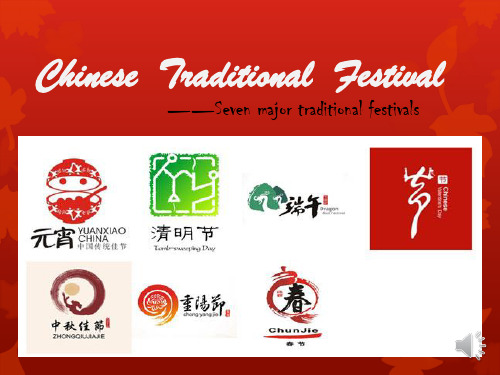
Qingming Festival
Qing Ming is a time to remember the dead and the dearly departed. More important, it is a period to honour and to pay respect to one's deceased ancestors and family members. Because it reinforces the ethic of filial piety, Qing Ming is a major Chinese festival. Literally meaning "clear" (Qing) and "bright" (Ming), this Chinese festival falls in early spring, on the 106th day after the winter solstice. It is a "spring" festival, and it is an occasion for the whole family to leave the home and to sweep the graves of their forebears. Chinese being practical people this sweeping of the graves is given an extended period, that is, 10 days before and after Qing Ming day. Among some dialect groups a whole month is allocated.
中国的传统节日英语作文
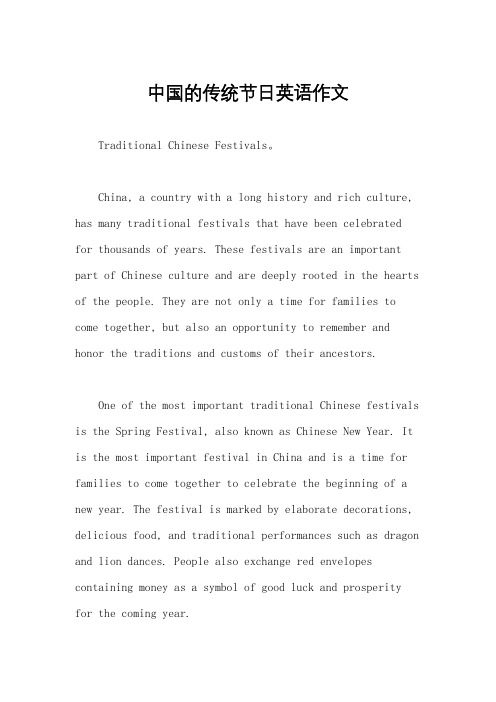
中国的传统节日英语作文Traditional Chinese Festivals。
China, a country with a long history and rich culture, has many traditional festivals that have been celebratedfor thousands of years. These festivals are an important part of Chinese culture and are deeply rooted in the hearts of the people. They are not only a time for families to come together, but also an opportunity to remember and honor the traditions and customs of their ancestors.One of the most important traditional Chinese festivals is the Spring Festival, also known as Chinese New Year. It is the most important festival in China and is a time for families to come together to celebrate the beginning of a new year. The festival is marked by elaborate decorations, delicious food, and traditional performances such as dragon and lion dances. People also exchange red envelopes containing money as a symbol of good luck and prosperityfor the coming year.Another important festival is the Mid-Autumn Festival, also known as the Moon Festival. It is a time for families to come together and give thanks for the harvest. The festival is marked by the eating of mooncakes, which are round pastries filled with sweet bean paste or lotus seed paste. Families also gather to admire the full moon and pray for good fortune and happiness.The Dragon Boat Festival is another importanttraditional Chinese festival. It is celebrated on the fifth day of the fifth lunar month and is a time to commemorate the death of the poet Qu Yuan. The festival is marked by dragon boat races, where teams of rowers paddle to the beat of drums in a race to the finish line. People also eat zongzi, which are pyramid-shaped dumplings made of glutinous rice wrapped in bamboo leaves.In addition to these major festivals, there are many other traditional Chinese festivals that are celebrated throughout the year. These include the Lantern Festival, the Qingming Festival, and the Double Ninth Festival, amongothers. Each festival has its own unique customs and traditions, but they all share a common theme of bringing families together and honoring the cultural heritage of China.In recent years, there has been a renewed interest in traditional Chinese festivals as people seek to reconnect with their cultural roots. Many young people are taking an active role in preserving and promoting these festivals, organizing events and activities to ensure that thetraditions are passed down to future generations. This has led to a resurgence of interest in traditional crafts, music, and dance, as well as a renewed appreciation for the values and customs that are at the heart of these festivals.In conclusion, traditional Chinese festivals are an important part of the country's cultural heritage and are a time for families to come together and celebrate. They are an opportunity to honor the traditions and customs of the past, and to pass them down to future generations. As China continues to modernize and develop, it is important toremember and preserve these festivals as a way of maintaining the country's rich cultural heritage.。
中国传统节日介绍英文版

Mid Autumn Festival
Date
The 15th day of the eight lunar month, commonly in September or October
History and Tradition
Also known as the Moon Festival, it's a time for family reunions and moon gaming Traditions include eating mooncakes and landscapes made of various shapes and sizes
Characteristics
These festivals typically involve family gatherings, special foods, and activities that are deeply rooted in Chinese culture and often tied to lunar calendar dates, academic cycles, and any legends or historical events
Origin and History of Chinese Traditional Festivals
Incident Origins
Many Chinese festivals have their roots in any agricultural practices and beliefs, so as the Spring Festival (Chinese New Year) marking the end of winter and the beginning of the lunar new year, or the Mid Autumn Festival celebrating the harvest moon
中国传统节日英文介绍
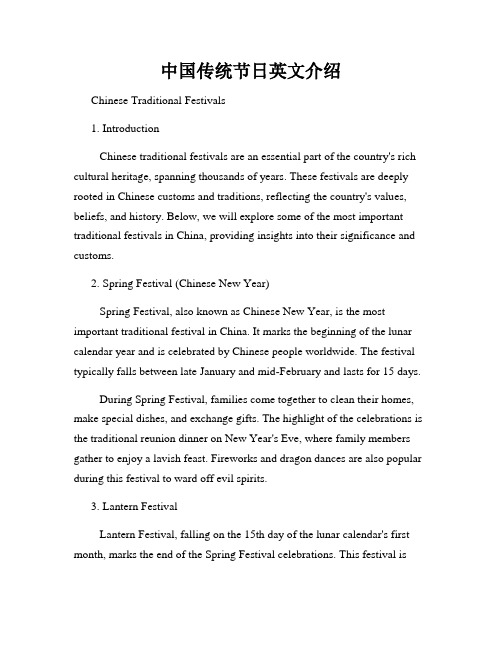
中国传统节日英文介绍Chinese Traditional Festivals1. IntroductionChinese traditional festivals are an essential part of the country's rich cultural heritage, spanning thousands of years. These festivals are deeply rooted in Chinese customs and traditions, reflecting the country's values, beliefs, and history. Below, we will explore some of the most important traditional festivals in China, providing insights into their significance and customs.2. Spring Festival (Chinese New Year)Spring Festival, also known as Chinese New Year, is the most important traditional festival in China. It marks the beginning of the lunar calendar year and is celebrated by Chinese people worldwide. The festival typically falls between late January and mid-February and lasts for 15 days.During Spring Festival, families come together to clean their homes, make special dishes, and exchange gifts. The highlight of the celebrations is the traditional reunion dinner on New Year's Eve, where family members gather to enjoy a lavish feast. Fireworks and dragon dances are also popular during this festival to ward off evil spirits.3. Lantern FestivalLantern Festival, falling on the 15th day of the lunar calendar's first month, marks the end of the Spring Festival celebrations. This festival ischaracterized by the display of colorful lanterns and various cultural activities.People often write riddles on their lanterns for others to solve, adding an element of fun and intellectual challenge to the festival. The iconic lanterns take many forms, including those shaped like animals, flowers, or famous landmarks. Watching the lanterns light up the night sky is a mesmerizing experience.4. Dragon Boat FestivalThe Dragon Boat Festival, also known as Duanwu Festival, is celebrated on the fifth day of the fifth lunar month. This festival commemorates the famous poet Qu Yuan and is characterized by the exciting racing of dragon boats.Dragon boat races involve teams of rowers paddling vigorously to the beat of a drum, competing to reach the finish line first. These races attract huge crowds of spectators who cheer and encourage the participants. Another significant tradition of this festival is the consumption of sticky rice dumplings called zongzi, which are wrapped in bamboo leaves.5. Mid-Autumn FestivalThe Mid-Autumn Festival, also known as the Moon Festival, is celebrated on the 15th day of the eighth lunar month. This festival is a time for family reunions and the appreciation of the full moon's beauty.The festival is closely associated with the legend of Chang'e, a celestial being who resides on the moon. During this festival, people gather to enjoy mooncakes, round pastries filled with various sweet or savory fillings.Lanterns in the shape of the moon are also prevalent during this festival, adding to the festive atmosphere.6. ConclusionChinese traditional festivals are not only grand celebrations but also an embodiment of the Chinese people's cultural identity and historical roots. Through these festivals, people reaffirm their bonds with family, pay respects to ancestors, and pass down customs and traditions to future generations.As China continues to modernize, it remains essential to preserve and cherish these traditional festivals as they play a vital role in maintaining cultural cohesion and fostering a sense of national unity. By understanding and appreciating these festivals, one can gain a deeper insight into the rich cultural tapestry of China.。
中国传统节日(Chinese__Traditional__Festival)

Qingming
T he D ra gon B oa t F e stiva l
In 5th, May (lunar year), the Chinese celebrate this festival every year. In China, the day is also called the Double-Five Festival. Its history: About 2000 years ago (the Spring-Autumn &War State Period), there were seven states in china and among of which Qing State was the strongest one that wanted swallowed up the six other states. So the QingStatesent a spy to the ChuStatealienating its court. At last Quyuan, one patriot, was discharged. Due to his affection towards his motherland, Sir Qu could not put into practice of his ability. Seeing such terrible situation, he could do nothing to help the king. So he chosen to die and sacrifice himself for his motherland. As a result, every year the Chinese make special food Zhongzi (use some green herb leaves to wrap rice and tie it with a thread) then throw into the river, wishing fish and shrimp may eat Zhongzi and not Sir Qu „s body. They also hold the Dragon Boat Racing for scar the fish eating Sir. Qu. By this way the Chinese folk pay homage to the respected patriot. But today the customs is a little bit changed. Many folk can eat the green bean cake except the Zhongzi and the Dragon Boat Racing and most importantly the family member can hold together to appreciate the holiday.
Chinese Traditional Festivals(中国传统节日)

Useful dialogue
The Spring festival is also known as the Chinese New Year, which is the most important traditional festival in China.
It falls on the first day of the
3. Whole fisinese language is pronounced as “Yu”. It sounds like “余”. “年年有余”means
togetherness and abundance(富足).
Group work
Which festival do you like best? Why? List your reasons.
• The Double—seventh Festival is not so well—known to many young people.but the related sad love story about the poor cowherd and the Girl Weaver has been passed down from generation to generation
springfestival春节lanternfestival元宵节dragonboatfestival端午节chinesetraditionalfestivals端午节midautumnthemoonfestival中秋节qixifestivaldoubleseventh七夕节doubleninthfestival重阳节tombsweepingfestival清明节otherfestivalsnewyearsdaywomensdayarborday植树节internationallabordayyyouthdaychildrensdayarmybirthdayteachersdaynationaldaythenewyearseveleadin?lookatthepictureswhichmayremindyouofthememoryofthespringfestivalfirecrackerslunarnewyearspaintingspapercutspringfestivalcoupletsnewyearsvisitcctvspringfestivalgalastep1brainstormbrainstormvocabularyonthespringfestivalingroups
介绍中国的新年英语作文(通用10篇)
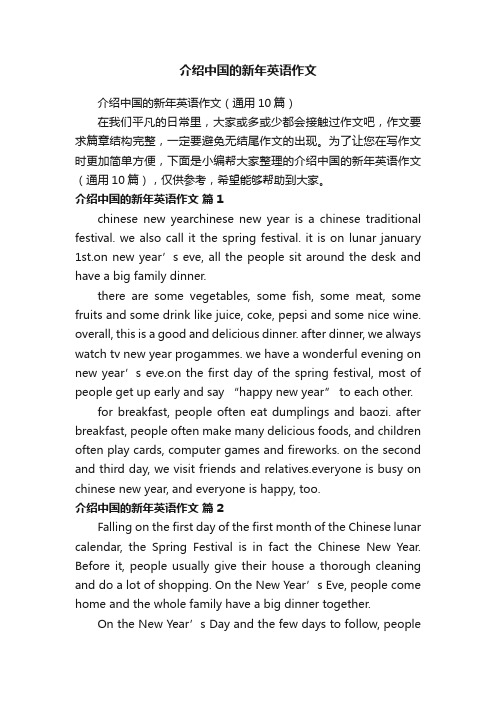
介绍中国的新年英语作文介绍中国的新年英语作文(通用10篇)在我们平凡的日常里,大家或多或少都会接触过作文吧,作文要求篇章结构完整,一定要避免无结尾作文的出现。
为了让您在写作文时更加简单方便,下面是小编帮大家整理的介绍中国的新年英语作文(通用10篇),仅供参考,希望能够帮助到大家。
介绍中国的新年英语作文篇1chinese new yearchinese new year is a chinese traditional festival. we also call it the spring festival. it is on lunar january 1st.on new year’s eve, all the people sit around the desk and have a big family dinner.there are some vegetables, some fish, some meat, some fruits and some drink like juice, coke, pepsi and some nice wine. overall, this is a good and delicious dinner. after dinner, we always watch tv new year progammes. we have a wonderful evening on new year’s eve.on the first day of the spring festival, most of people ge t up early and say “happy new year” to each other.for breakfast, people often eat dumplings and baozi. after breakfast, people often make many delicious foods, and children often play cards, computer games and fireworks. on the second and third day, we visit friends and relatives.everyone is busy on chinese new year, and everyone is happy, too.介绍中国的新年英语作文篇2Falling on the first day of the first month of the Chinese lunar calendar, the Spring Festival is in fact the Chinese New Year. Before it, people usually give their house a thorough cleaning and do a lot of shopping. On the New Year’s Eve, people come home and the whole family have a big dinner together.On the New Year’s Day and the few days to follow, peopleoften visit their relatives and friends to give one another their best wishes for the New year. Throughout this festival period firecrackers can be heard everywhere. This festival is the most important festival for the Chinese.介绍中国的新年英语作文篇3New Year is the most grand festival for the Chinese nation, on this day, no matter how far apart, people all want to go back to home, with parents, family reunion. In the heart of every Chinese, Spring Festival has the extremely important status.The Spring Festival is my favorite holiday, because on this day, I can eat a lot of delicious food, also can get lucky money, more importantly, on this day, we are a large family to gather together together, recounting and wishing each other. Every year the Spring Festival, mother always do a big table, lets eat. After dinner, mom will pack a big red packets to me, I wish my next year to study progress, healthy growth.The highlight of the Spring Festival is a family reunion dinner, put on the eve of the, because we do have, every time, I always eat very enjoyable. Finished eating dinner, we will watch Spring Festival gala on TV, hereinafter referred to as "gala", in the spring night, each hero qi, off stage, singing away, altogether celebrates the New Year. Blessing of our motherland, our national prosperity, endless.The Spring Festival, is my favorite holiday!介绍中国的新年英语作文篇4The Spring Festival,Chinese New Year,is the most important festival for all of us. All family members get together on New YearEve to have a big meal.At the same time, everyone celebrates to each other.At about 12 oclock,some parents and children light crackers.The whole sky is lighted brightly. We maywatch the fireworks excitedly.How busy it is!On the first early moring of one year, many senior citizen get up early and they stick the reversed Fu or hang some couplets on the front door. Some houses windows are sticked on red paper cuttings.The Chinese New Year lasts fifteen days. So during the fifteen days, we always visit our relatives from door to door. At that time, children are the happiest because they can get many red packets form their parents,grandparents, uncles, aunts and so on. The last day of the Chinese New Year is another festival. It names the Lantern Festival.So the Chinese New Year comes to the end.介绍中国的新年英语作文篇5Spring Festival, as the name suggests, should be a celebration of the arrival of spring, which is the most influential traditional festival in our country and in the Chinese world. From the seven Laba to the first month of the month fifteen, people are immersed in the joy of the festival. The friends of the family regardless of those far apart from each other, the landscape barrier, on behalf of worship parents home, on behalf of a family reunion to go home, get together during the spring festival.The Spring Festival highlights to the number of reunion dinner. This day the people are the busiest. The kitchen cooking and steaming, frying pans Qiming; fragrance, grandma and grandpa knife skills, mom and dad a good cook. The lazy people like me also have to take part in cleaning up the house and receiving the guests. Have a little earlier and I look forward to the reunion dinner, in order to gobble down.Four pm, in succession to relatives, after some pleasantries, promotion according to status table. A table full of dishes, cupsof wine, full of affection, filled the entire space. The first ones Bailie Zu column, and bless grandparents, parents and elders, and the brothers and sisters bless each other or ridicule. After three drinks, the atmosphere is more enthusiastic, a toast, also depends on the wine, the wine glasses have shown as a ring. A reunion dinner, at least at one or two hours, dont stop.No matter how much wine they drink, they always forget one thing, that is, watching the "Spring Festival Gala" of CCTV. People in the living room are too crowded to see the TV in the bedroom, the computer in the study, and even the mobile phone. When the Spring Festival host rounded the new years bell, thousands of fireworks were lifted up, and the city was like a city of illusions.After the new years Eve, it was the first day of the year. Looking ahead, street, alley, such as heavy traffic, pedestrian travel, people pay New Years call in a continuous line. Adults and children, wherever they meet, are the blessing of each other, the sound of happiness in the new year, the sound of fireworks and the deafening of the fireworks.Spring Festival, this is so quietly, and so far away. The Spring Festival, since it is a spring festival, reminds me of the unknown verse:How much is spring, what is your spring? Spring gives hope to people, what do you give to spring?介绍中国的新年英语作文篇6As the spring festival is coming, I decide to tell you something about Spring Festival. Spring Festival ,known as the Chinese New Year,which counts from the first day in the lunar calendar ,and is the most important holiday in China.From late January to early February,Chinese people are busy preparing for the New Year.They clean their houses ,have theirhair cut,and buy new clothes .Jiaozi or dumpling is most popular.T o those who live far away from their home,this festival is also a family reunion occasion.And they often go back home to celebrate the festival with their family.At the time,the children will play the fireworks and firecracker。
像外国人介绍一个中国传统节日的英语作文
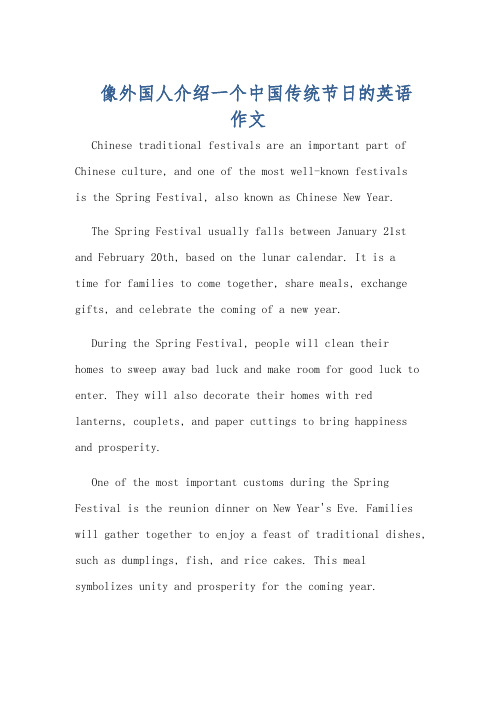
像外国人介绍一个中国传统节日的英语作文Chinese traditional festivals are an important part of Chinese culture, and one of the most well-known festivalsis the Spring Festival, also known as Chinese New Year.The Spring Festival usually falls between January 21st and February 20th, based on the lunar calendar. It is atime for families to come together, share meals, exchange gifts, and celebrate the coming of a new year.During the Spring Festival, people will clean their homes to sweep away bad luck and make room for good luck to enter. They will also decorate their homes with red lanterns, couplets, and paper cuttings to bring happiness and prosperity.One of the most important customs during the Spring Festival is the reunion dinner on New Year's Eve. Families will gather together to enjoy a feast of traditional dishes, such as dumplings, fish, and rice cakes. This meal symbolizes unity and prosperity for the coming year.Another popular tradition during the Spring Festival is giving red envelopes, or "hongbao," to children and unmarried young adults. These red envelopes contain money and are believed to bring good luck and blessings for the new year.Fireworks and dragon dances are also common during the Spring Festival, as they are believed to ward off evil spirits and bring good fortune. The festival concludes with the Lantern Festival on the 15th day of the lunar new year, where people will gather to admire colorful lantern displays and eat sweet rice balls.Overall, the Spring Festival is a time for joy, togetherness, and the celebration of new beginnings. It is a cherished tradition that has been passed down for generations in Chinese culture.中国传统节日是中国文化的重要组成部分,其中最著名的节日之一就是春节,也被称为中国新年。
Chinese Traditional Festivals(中考满分作文)

Chinese Traditional Festivals假设你是李华,你的英国笔友Nancy 对中国传统节日很感兴趣,请你写一封邮件介绍一个中国传统节日并向她发出邀请。
内容包括:(1)简要说明你的写信意图;(2)节日基本信息及上次你是如何庆祝的;(3)邀请她来中国体验这个节日。
(范文一)Dear Nancy,Knowing that you take great interest in(非常感兴趣)Chinese traditional festivals. I’m writing this letter to introduce a festival---the Spring Festival and invite you to come to China.The Spring Festival is one of the most important festivals for Chinese people, which(非限)(写作标配)always falls in January or February. It is regarded as(被认为是)the biggest event(事件). Getting together with family is a vital custom(一个重要的习俗)for us. Last year, I went to my grandparents’ home with my parents to celebrate it. We all got up early in the morning and wore out new clothes. In the afternoon, we did cleaning and put up the couplets(对联). To my great joy, I got more than ten red packets(红包)from the elderly(年长者;长辈)! What an unforgettable experience it was!(感叹句!你不试试看?)Not only did I have a great time but also I learnt from about the spirit of the festival!(倒装句,强推)In a word, it’s a pity if you miss the festival. I’m looking forward to celebrating this festival with you in China this year.(范文二)Dear Nancy,I’m glad to hear that you take great interest in Chinese traditional festivals. Here I want to introduce the Lantern Festival to you.Lantern Festival is one of the biggest festivals in China. It is celebrated on(被庆祝)the 15th day of the first lunar month and marks the end of the Spring Festival. Last year, my family and I celebrated it at my grandma’s house. We made tangyuan with rice flour (面粉,发音同flower)and had it for dinner. After supper, we went to watch the lantern show. I was greatly impressed by(留下深刻的印象)the lanterns which were made in the shape of different(用不同的形状)animals, vegetables, fruits and many other things. While we were enjoying the colourful lanterns, we had fun guessing the lantern riddles(谜语). How amazing it was to see so many people with happy faces!(又感叹了!你会了吗?)I strongly(强烈地)suggest that you pay visit to China to celebrate the wonderful festival with us and experience the traditional Chinese culture!(范文三)Dear Nancy,I’m glad that you show great interest in Chinese festivals. Here I’d like to tell you something about the Mid-Autumn Festival and invite you to celebrate it with me this year.Mid-Autumn Festival falls on August 15th of lunar calender and it is time to celebrate the harvest and enjoy the beautiful moonlight. People always get together with their families on that day and appreciating the moon is the most popular activity. Last year my relatives got together an we ate our favourite fruits and desserts in the yard. Meanwhile, my father told us stories about Chang’e. the scene brought back my memory of th happy time we spent together with my grandpa on the festival last year. How I miss them now!If you can spend the Mid-Autumn Festival with us this year, I am sure you’ll have a memorable experience!。
Chinese_Traditional_Festivals_中国传统节日

(初中天地)9 Chinese traditional festivals, as1)treasures of the Chinese nation’slong history and culture, have been1) treasure [ˈtreʒəz] n. 财富;珍品2) profound [prəˈfaʊnd] adj. 深刻的;极大的3) diverse [daɪˈvɜːs] adj.不同的;各式各样的4) primitive [ˈprɪmətɪv] adj. 原始的;远古的5) couplet [ˈkʌplət] n. 对句;对联Chinese Traditional Festivals中国传统节日◎佛罗里达大学 王梓菲传统节日是传承优秀历史文化的重要载体,既使人们在节日中增长知识,受到教益,又有助于彰显文化、弘扬美德、陶冶情操、弘扬传统。
下文中所列举的5个中国传统节日,你了解多少呢?developed from ancient ancestors and passed down to today, recording the 3)diverse in form and rich in content, including 4)primitive beliefs, sacrificial culture, astronomy calendar and other cultural and natural contents. Here are five out of many Chinese traditional festivals.1. New Year’s EvePeople often stay up all night on New Year’s Eve. It is called “Shousui”. On New Year’s Eve, all the families not only do the cleaning around the house, but also paste Spring Festival 5)couplets, New Year pictures, pa-per-cuts and “Fu” word. Everyone puts on clothes with festive colors and pat-terns.Copyright©博看网. All Rights Reserved.2. The Spring FestivalIn general, people eat rice cakes, dumplings, sweet dumplings, big meat -balls, a whole fish, apples, peanuts, melon seeds, sweets, etc., during the Spring Festival. There are also giving lucky money , paying a new year call , visiting relatives , giving gifts for the coming year , worshiping their ancestors , visiting the flower markets and many other activities. People spend quality time with their family during the period.3. The Lantern FestivalThe Lantern Festival marks the end of Chinese New Year celebrations , on the fifteenth day of the new lunar year. On this day , families gather to eat food , watch lantern shows and guess lantern riddles.4. Tomb Sweeping DayOn this day , families would get together and pay respects to their ances-tors. People would sweep the tombs , remove the weeds. Other activities in-clude hiking, flying kites and so on.5. Dragon Boat FestivalOccuring on the 5th day of the 5th month of the lunar calendar , the Dragon Boat Festival is one of the most important festivals in China. In memory of Qu Yuan , people race dragon boats and eat zongzi on this day.10Crazy English /中国风Chinese Elements Copyright©博看网. All Rights Reserved.中国传统节日,是中华民族悠久历史文化的瑰宝。
Chinese-Traditional-festival(中国传统节日)
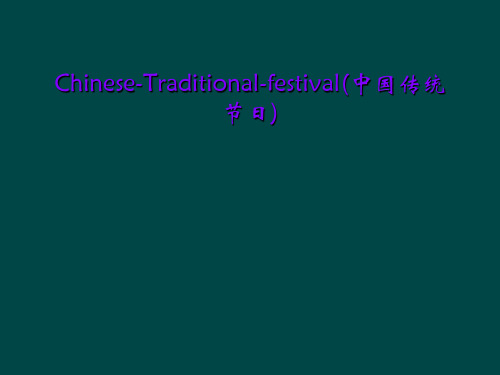
Chinese New Year Traditions
The Lantern Festival marks the end of the Chinese New Year season and afterwards life becomes daily routines once again. Traditions of the Chinese New Year vary from place to place, considering that China is a big country not only geographically, but also demographically and ethnically. Yet, the spirit underlying the diverse celebrations of the Chinese New Year is the same: a sincere wish of peace and happiness for the family members and friends.
Chinese-Traditional-festival(中国传统 节日)
Ⅰ, Introduction for classify of Chinese Traditional Festival
Ⅱ, There are mainly 6 festivals celebrated in China A, The Chinese New Year B, The lantern Festival C, The Qingming festival D, The Dragon boat Festival E, The mid-Autumn Festival F,The Double Ninth festival
中国传统节日Chinese_Traditional_Festivals
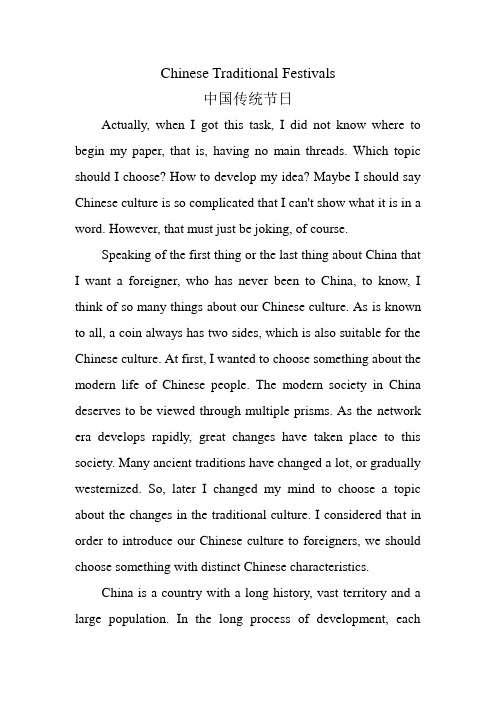
Chinese Traditional Festivals中国传统节日Actually, when I got this task, I did not know where to begin my paper, that is, having no main threads. Which topic should I choose? How to develop my idea? Maybe I should say Chinese culture is so complicated that I can't show what it is in a word. However, that must just be joking, of course.Speaking of the first thing or the last thing about China that I want a foreigner, who has never been to China, to know, I think of so many things about our Chinese culture. As is known to all, a coin always has two sides, which is also suitable for the Chinese culture. At first, I wanted to choose something about the modern life of Chinese people. The modern society in China deserves to be viewed through multiple prisms. As the network era develops rapidly, great changes have taken place to this society. Many ancient traditions have changed a lot, or gradually westernized. So, later I changed my mind to choose a topic about the changes in the traditional culture. I considered that in order to introduce our Chinese culture to foreigners, we should choose something with distinct Chinese characteristics.China is a country with a long history, vast territory and a large population. In the long process of development, eachethnic group has formed various customs and habits of their own, covering clothing, food, living, and transport; festive occasions, etiquette and offering sacrifies; religious beliefs and folk worship; and also marriage, giving birth and funerals. These traditional customs have lasted for many centuries and become the traditions preserved by each ethnic group; some have gradually evolved into the common customs of the Chinese nation. In this paper, I just want to introduce the Chinese traditional festivals which have gradually lost their true features. Maybe it has been so difficult for us to remember what they were before.1. A brief introduction of Chinese traditional festivalsChinese traditional festivals, which are different from other common holidays, are an important part of the national cultural heritages. They are the typical Exhibition Days of the public spiritual beliefs, aesthetic interests, ethical relations and consumptive habits, which bears the rich historical and cultural connotation. Hence the value and significance of traditional festivals should be fully realized and the proactive inheritance and construction should be carried out.In China, human relations and blood ties are highly valueddown the ages. For thousands of years, Chinese people have formed so many festive etiquettes and customs that contain rich ethical concept and humanistic spirit, which makes the essence of the true, the good, the beautiful and the harmonious show their best side to the Chinese traditional culture. We have a family reunion to ring out the old year and ring in the new on New Year's Eve; we sweep the ancestors' tombs to offer sacrifices and show respect to our ancestors in Tomb-sweeping Festival; we have the Dragon Boat Racing to mourn for Qu Yuan in the Dragon Boat Festival; we get together to spend the happy moment with our family on the Mid-Autumn Festival; we climb high to show our respect to the aged people on the Double-ninth Day. Of course these are just a small piece of our Chinese cultural feast. These traditional festivals rooted in the soil of the nation who has brought them up, with distinct national mark. They casted the national characteristics, inherited the national culture, carried forward the national virtue, and took these as their main melody, with the dense breath of family loving and patriotism.2.Characteristics of Chinese traditional festivals2.1. Long history, inheriting constantlyThe forming process of traditional festivals is the accumulating process of a people or a nation's history and culture. The Spring Festival, the Lantern Festival, the Tomb-Sweeping Day, the Dragon Boat Festival, the Mid-Autumn Festival and so on, are all developing from the ancient times. From these festivals which have spread so far, we can still see the splendid pictures of the social life of ancient people.The origin and development of traditional festivals is a process with gradually formation, unconsciously perfection and slowly penetration into the society. It is the result of the society which has developed to a certain degree, the same as the development of our society. Our traditional festivals are also without exception. Most of them are in relation to the astronomy, the calendar and the maths, as well as the Solar Terms which were divided later.What deserved to be mentioned is that, during the long history, generations of scholars and poets have created a lot of eternal masterpieces to express these festivals. These poems and essays have won universal praise and been widely spread, which makes our traditional festivals reflect deep cultural connotations. They are not only wonderful and romantic, but also suited forboth refined and popular tastes. Chinese festivals have got quite strong cohesiveness and wide inclusiveness. When a festival comes, there is a nationwide celebration all over our country. This is in the same line as the long history of our Chinese people which is a precious cultural heritage of our national spirit.2.2. Rich and colorful, broad and profoundThe richness and colorfulness of Chinese Festivals is mainly manifested in the thousands of different kinds of traditional festivals of ethnologic group. At the same time, the festive activities are also full of variety. Just take the Spring Festival as an example, there are dozens of celebrative activities during this season. We should do shopping for the spring festival. We usually adhibit Menshen, new year paintings, Spring Ox pictures, Men zhan, spring festival couplets, paper-cuts, the Chinese character"Fu" and so on. We go out to give new year's greetings, see lion and dragon dances, as well as various shows. We will stay up the eve and send the gift money to the children. We need to offer sacrifices to our ancestors during the festival. Another important thing is the family reunion dinner on the new year's eve, and we always eat dumplings at this time. This is the traditional appearance of our Spring Festival. However, it has changed a lot in the modern society. Nowadays, it has graduallybeen modernized and many traditional activities are forgotten by us. Many people realized that the modern Spring Festival is so lack of sense of festivity.2.3. Pluralistic, Harmonious blendingAs there are 56 peoples in China, the same festival maybe different from each other in forms and contents. Each people has their distinct characteristics. We have the same festivals shows the same identification of our Chinese culture. On the other hand, the different details shows the colorfulness and harmony of our multicultural background. This happens to have the same view of the theme of our national spirit, that is, try our best to build a harmonious society.2.4. Agriculture-based,light to farmersChinese traditional festivals are typically agriculture-based. There are so few festivals that relate to the commerce. Most of them are based on the farming activities, such as farming work, herding, fishing, forestry and avocations. This must be traced back to the agricultural civilization in the ancient times. China has a long history of agricultural society. The Chinese Calendar is the result of agricultural civilization. So of course the traditional festivals which originated in the Calendar must mainly serve for the agricultural production, no matter incharacter or form.That is to say, the generation and inheriting of Chinese traditional festivals rooted in the thousands-year's farming civilization. Specifically, it manifests in several aspects. The Chinese lunar calendar which serves for agricultural production divided the specific seasonal nodes for it. The most honored philosophical thinking of Chinese people----"beatific union" gets rid of the occasionality of these seasonal nodes and endows them more metaphysical meanings. The Confucian ethics that was worshiped and exploited by the feudal authorities enriched the social foundation and practical importance of these festivals, as well as their practicing forms.2.5. Greater and greater international effectThe traditional Chinese festivals are also going abroad as time goes on. They will have greater and greater international effect in the coming future. Just like our major--Teaching Chinese as a Foreign Language, we are spreading our language to the world. As China is becoming stronger and stronger, the Chinese culture is also becoming more and more well-known by the whole world. For instance, there are more than 20 countries all over the world ,who are publishing the ShengXiao stamps from China. The traditional Chinese festivals are heading for thedeveloped countries, spreading and carrying forward our Chinese traditional culture throughout the world. This makes great contribution to our effort of building a multicultural harmonious world.2.6. New changes and new problemsAs is discussed above, the traditional Chinese festivals have changed a lot from its original appearance. Maybe we can call it modernization of festivals. In the meanwhile, new problems have emerged constantly.The first change is that many festivals of ethnic minorities have stepped into towns and celebrate in other regions, making great contribution to introducing our national culture and accelerating the process of building a harmonious society. The second is that some of the traditional festivals change to be hold by the authorities and filled in new content, making great contributions to our investment attracting and tourism developing.The new problems are mainly as follows. First of all, people turn to focus more on food and drinks and ignore the spiritual value. On the other hand, people pay more attention to earning money and despise the cultural connotation. In addition, more and more corruption phenomena are propagatingaccompany with the festive activities. Only if we pay attention to overcome these problems in the very Chinese festivals, can we exploit and take advantage of our traditional festivals. At the same time, it is beneficial to propagate our exceptional Chinese traditions and keep our festive culture a sound development.3.The modern value of traditional festivalsThe famous writer Shakespeare once said" The biggest sorriness of human beings is that they are unable to know themselves". Mr. Fei Xiaotong also once put forward an idea of "cultural consciousness". Both of them meant that we should have self-knowledge about ourselves and our culture.3.1. The folklore connotation of traditional festivals3.1.1. Reflecting strong moral and kinship conceptChina is a nation who takes the moral and kinship so seriously. While the traditional Chinese festivals offer the chance for enhancing the connection of blood relatives and consolidating the relative concept of family members. This can be profoundly reflected by the numerous etiquettes and customs of traditional festivals. Taking the Tomb-sweeping Day and Mid-autumn Festival as an example, the Tomb-sweeping Day adequately reflects the family feelings of Chinese people.W orshiping ancestors and visiting tombs are the central activities of Tomb-sweeping Day, which aims at expressing the filial piety and long for our ancestors. These customs are so important in the patriarchal society, as well as the modern society. As for Mid-autumn Festival, family reunion is its central signification. This is mainly because that Chinese people have strong feelings of family ethics and pay much attention to the blood relations, thus forming a harmonious folk psychology. For this reason, people think of the reunion of the world from the full moon in the sky. So the Mid-autumn Festival is also called "Family Reunion Day".3.1.2. Showing forceful group consciousnessThe traditional festivals, which originated in the common people, have gradually developed into a kind of social custom and been inherited through conventional activities. As a result, they are of a certain social significance, becoming the mai n form of community activities. This can be reflected by many traditional activities of the traditional festivals. The various folk activities during Spring Festival are the best example of this. While the comparatively-large community activity of Chinese traditional festivals is the dragon-boat racing in Dragon Boat Festival. This kind of sport shows the most obvious integrationof social consciousness as a traditional custom. Its interesting character and the cooperation spirit in it have enhanced the cohesion of the group, further consolidating the collective consciousness of a social group.3.1.3. Depositing abundant folk culturesThe traditional festivals of our country are inherited from generation to generation , depositing so abundant knowledge of folk culture, which is mainly manifested in the calendar, the solar terms and the festival customs. Our traditional Chinese festivals are the accompaniments of agricultural civilization. Every traditional festival has its unique convention, which vividly shows their individuality. In these regular traditional festivals, the values, morals and aesthetic interests of these festive customs are gradually deposited to form a kind of folk culture.3.2. The value and significance of traditional festival regressionUnder the influence of the globalization, the Chinese society is experiencing a tremendous and historical vicissitude. The national cultural tradition is experiencing an unprecedented test. As the carrier of our national culture, the traditional festivals have got giant impact by some foreign festivals, such as Christmas Day and Valentine's Day. People seem to pay moreattention on these foreign festivals and forget our traditional Chinese festivals little by little.Recalling our childhood, we can see the changes in our customs of the festivals. When we were young, the Spring Festival is the most expecting season of a year. Because we can have many delicious food and drinks, we can get the gift money from the elders, we can wear new clothes and play with our friends as much as we liked. Another is the Mid-autumn Festival, we will celebrate it every year as an important affair of a year and on that day, we will visit our relatives and have a family reunion. However nowadays, people, especially the younger generations, are more expecting the Christmas Day or the Valentine's Day than the traditional Chinese festivals. You can see the Christmas trees everywhere in the street, even one month before December 25th. Actually, no matter the traditional festivals or the foreign ones are taken advantage of by the sellers. They can get a quite good earning from these festivals. There seems to be more and more foreign festivals being celebrated. We can hear something like"April Fool's Day" "Double Eleven Day" "Double Twelve Day" and so on. Some of them are too strange to be a festival.It seems that it's very necessary for us to advocate thetraditional festival regression. Here are some reasons to support it. The first one is that traditional festivals are helpful for inheriting national culture and enhancing national memory. On the other hand, traditional festivals are conducive to adjusting people's body and mind.As with the value and significance of traditional festival regression, we find that it is quite significant for strengthen the national cohesion and it is far-reaching for the protection and inherit of Chinese festive customs. We must call on every Chinese people to take the traditional festivals seriously and have a correct view of them. Actually, our country has already done something of traditional festival regression and protection. Recent years have seen the changes on the extending of holidays, including the Tomb-sweeping Day, the Dragon-boat Festival and the Mid-autumn Festival and so on. That is to say, our government has taken it seriously to protect and propagate our traditional festivals. It is good for the whole society to take part in the construction of value identification and build a healthy and harmonious cultural circumstance. This will be a grand action to manifest the value of our national culture, strengthen the storage of our national customs, inherit our folk heritage and push forward the harmonious national culture.References:[1] 任启亮. 中国文化常识[M]. 香港中国旅游出版社, 2008[2] 肖琴. 论中国传统节日文化的传承与创新[J]. 船山学刊, 2009, (1)[3] 董晓萍. 说话的文化———民俗传统与现代生活[M] . 北京:中华书局, 2002[4] 蓝巧燕. 从中国传统节日的走向看中华民族传统文化的保护[J]. 许昌学院学报, 2006, (3)[5] 董晓萍. 民俗文化遗产保护三阶段论要[J ] . 文史知识, 2004 , (1)[6] 萧放. 传统节日:一宗重大的民族文化遗产[J]. 北京师范大学学报(社会科学版), 2005, (5)[7] 王晓梅. 从中西文化对比中透视八大传统节日的英译[J]. 太原科技大学学报, 2010, (2)[8] 卢晨. 对传统节日文化现代价值的思考[J]. 文学教育, 2009, (8)[9] 陈麦池. 跨文化视野中的我国传统节日变迁[J]. 河南工业大学学报(社会科学版), 2009, (4)[10] 黄辉. 中国传统节日的文化价值及现实意义[J]. 沙洲职业工学院学报, 2008, (2)[11] [韩] 洪尚郁. 中国传统节日的特点[D]. 中央民族大学博士学位论文, 2009The Dragon Boat FestivalThe Dragon Boat Festival, also called Double Fifth Festival, is celebrated on the fifth day of the fifth moon of the lunar calendar. It is one of the most important Chinese festivals, the other two being the Autumn Moon Festival and Chinese New Y ear.The origin of this summer festival centers around a scholarly government official named Qu Y uan. He was a good and respected man, but because of the misdeeds of jealous rivals he eventually fell into disfavor in the emperor's court.Unable to regain the respect of the emperor, in his sorrow Chu Y uan threw himself into the Mi Low river. Because of their admiration for Chu Y uan, the local people living adjacent to the Mi Lo River rushed into their boats to search for him while throwing rice into the w aters to appease the river dragons.Although they were unable to find Chu Y uan, their efforts are still commemorated today during the Dragon Boat Festival.Dragon Boat raceTraditions At the center of this festival are the dragon boat races. Competing teams drive their colorful dragon boats forward to the rhythm of beating drums. These exciting races were inspired by the villager's valiant attempts to rescue Chu Y uan from the Mi Lo river. This tradition has remained unbroken for centuries.Tzung TzuA very popular dish during the Dragon Boat festival is tzung tzu. This tasty dish consists of rice dumplings with meat, peanut, egg yolk, or other fillings wrapped in bamboo leaves. The tradition of tzung tzu is meant to remind us of the village fishermen scattering rice across the water of the Mi Low river in order to appease the river dragons so that they would not devour Chu Y uan.A y TasoThe time of year of the Dragon Boat Festival, the fifth lunar moon, has more significance than just the story of Chu Y uan. Many Chinese consider this time of year an especially dangerous time when extra efforts must be made to protect their family from illness. Families will hang various herbs, called A y Tsao, on their door for protection. The drinking of realgar wine is thought to remove poisons from the body. Hsiang Bao are also worn. These sachets contain various fragrant medicinal herbs thought to protect the wearer from illnessMid-Autumn FestivalMid-Autumn Festival is a special occasion for overseas Chinese, including those in the United States and the United Kingdom, to keep their heritage alive and introduce the younger generation to a celebration that can be traced back to the Xia Dynasty (21st-16th century BC).So what is the origin of the festival and how do overseas Chinese celebrate it? The Western Han philosophical classic, Huainanzi, attributes the origins of Mid-Autumn Festival to the legend of the star-crossed lovers Hou Yi and Chang E. After Hou, the imperial archer, was awarded the elixir of immortality for shooting down nine of the 10 wayward suns, his beautiful wife, Chang, took the potion and floated to the moon. She, the moon goddess, still lives there and is reunited with her husband, god of the sun, only on nights with a full moon.Among the many folk tales surrounding the festival is one of rebellion and intrigue. Legend has it that rebels disseminated details of a coup against the Yuan Dynasty (1271-1368) by putting them in mooncakes. On the night of what was the Moon Festival, the rebels attacked Beijing and overthrew the Mongol rulers, establishing the Ming Dynasty(1368-1644).Celebrated on the 15th day of the eighth month of the lunar calendar (which falls on Sept 30 this year), Mid-Autumn Festival is one of the several holidays that the Chinese celebrate with their families.Spring FestivalThe New Moon on the first day of the new year-- the full moon 15 days laterClick here for more words about the Spring FestivalChinese New Y ear starts with the New Moon(新月)on the first day of the new year and ends on the full moon(满月)15 days later. The 15th day of the new year is called the Lantern Festival(元宵节), which is celebrated at night with lantern displays and children carrying lanterns in a parade.The Chinese calendar is based on a combination of lunar and solar movements. The lunar cycle (月运周期)is about 29.5 days. In order to "catch up" with the solar calendar the Chinese insert an extra month once every few years (seven years out of a 19-yearcycle). This is the same as adding an extra day on leap year (闰年). This is why, according to the solar calendar, the Chinese New Y ear falls on a different date each year.New Y ear's Eve and New Y ear's Day are celebrated as a family affair, a time of reunion and thanksgiving. The celebration was traditionally highlighted with a religious ceremony given in honor of Heaven and Earth(万物), the gods of the household and the family ancestors.The sacrifice to the ancestors, the most vital of all the rituals(仪式), united the living members with those who had passed away. Departed relatives are remembered with great respect because they were responsible for laying the foundations for the fortune and glory of the family.The presence of the ancestors is acknowledged on New Y ear's Eve with a dinner arranged for them at the family banquet table. The spirits of the ancestors, together with the living, celebrate the onset of the New Y ear as one great community. The communal feast called "surrounding the stove" or weilu. It symbolizes family unity and honors the past and present generations.The Origin of Chinese New Y earThe Chinese New Y ear is now popularly known as the Spring Festival because it starts from the Begining of Spring (the first of the twenty-four terms in coodination with the changes of Nature). Its origin is too old to be traced. Several explanations are hanging around. All agree, however, that the word Nian, which in modern Chinese solely means "year", was originally the name of a monster beast that started to prey on people the night before the beginning of a new year.One legend goes that the beast Nian had a very big mouth that would swallow a great many people with one bite. People were very scared. One day, an old man came to their rescue, offering to subdue Nian. To Nian he said, "I hear say that you are very capable, but can you swallow the other beasts of prey on earth instead of people who are by no means of your worthy opponents?" So, it did swallow many of the beasts of prey on earth that also harrassed people and their domestic animals from time to time.After that, the old man disappeared riding the beast Nian. He turned out to be an immortal god. Now that Nian is gone and other beasts of prey are also scared into forests, people begin to enjoy their peaceful life. Before the old man left, he had told people to put up red paper decorations on their windows and doors at each year's end to scare away Nian in case it sneaked back again, because red is the color the beast feared the most.From then on, the tradition of observing the conquest of Nian is carried on from generation to generation. The term "Guo Nian", which may mean "Survive the Nian" becomes today "Celebrate the (New) Y ear" as the word "guo" in Chinese having both the meaning of "pass-over" and "observe". The custom of putting up red paper and firing fire-crackers to scare away Nian should it have a chance to run loose is still around. However, people today have long forgotten why they are doing all this, except that they feel the color and the sound add to the excitement of the celebration.Traditional New Y ear FoodsProbably more food is consumed during the New Y ear celebrations than any other time of the year. V ast amounts of traditional food is prepared for family and friends, as well as those close to us who have died.On New Y ear's Day, the Chinese family will eat a vegetarian dish called jai. Although the various ingredients in jai are root vegetables or fibrous vegetables, many people attribute various superstitious aspects to them.Other foods include a whole fish, to represent togetherness and abundance, and a chicken for prosperity. The chicken must be presented with a head, tail and feet to symbolize completeness. Noodles should be uncut, as they represent long life.In south China, the favorite and most typical dishes were nian gao, sweet steamed glutinous rice (糯米)pudding and zong zi (glutinous rice wrapped up in reed(芦苇)leaves), another popular delicacy.In the north, steamed-wheat bread (man tou) and small meat dumplings were the preferred food. The tremendous amount of food prepared at this time was meant to symbolize abundance and wealth for the household.。
初中英语人教版八年级上册Chinese Traditional Festivals
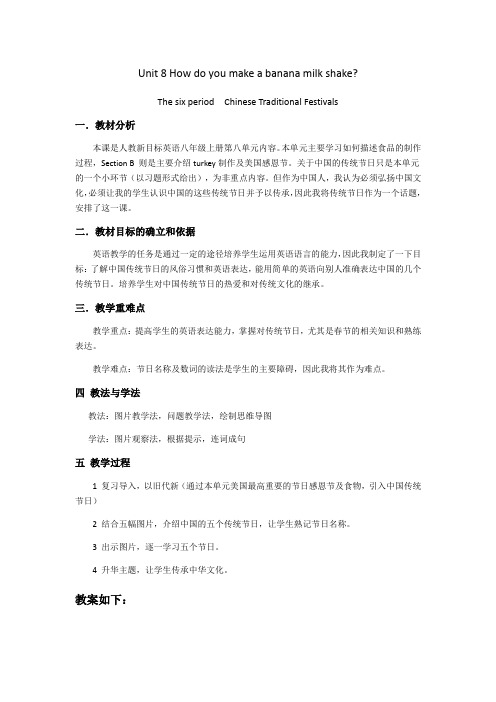
Unit 8 How do you make a banana milk shake?The six period Chinese Traditional Festivals一.教材分析本课是人教新目标英语八年级上册第八单元内容。
本单元主要学习如何描述食品的制作过程,Section B 则是主要介绍turkey制作及美国感恩节。
关于中国的传统节日只是本单元的一个小环节(以习题形式给出),为非重点内容。
但作为中国人,我认为必须弘扬中国文化,必须让我的学生认识中国的这些传统节日并予以传承,因此我将传统节日作为一个话题,安排了这一课。
二.教材目标的确立和依据英语教学的任务是通过一定的途径培养学生运用英语语言的能力,因此我制定了一下目标:了解中国传统节日的风俗习惯和英语表达,能用简单的英语向别人准确表达中国的几个传统节日。
培养学生对中国传统节日的热爱和对传统文化的继承。
三.教学重难点教学重点:提高学生的英语表达能力,掌握对传统节日,尤其是春节的相关知识和熟练表达。
教学难点:节日名称及数词的读法是学生的主要障碍,因此我将其作为难点。
四教法与学法教法:图片教学法,问题教学法,绘制思维导图学法:图片观察法,根据提示,连词成句五教学过程1 复习导入,以旧代新(通过本单元美国最高重要的节日感恩节及食物,引入中国传统节日)2 结合五幅图片,介绍中国的五个传统节日,让学生熟记节日名称。
3 出示图片,逐一学习五个节日。
4 升华主题,让学生传承中华文化。
教案如下:Ⅰ Teaching aimsIntroduce the five traditional festivals in China:the Spring Festival , Mid-Autumn Day ,the Dragon Boat Festival ,the Double Ninth Festival and the Lantern Festival .Ⅱ Teaching important and difficult pointsTeaching important points:The knowledge about the Spring Festival.Teaching difficult points:The dates and the food of each festivalⅢ Teaching methodsPPT , asking and answeringⅣ Teaching steps:Step 1 leading inWe have learned an important festival in the United States: Thanksgiving. We know most Americans still celebrate this festival by having a big meal at home withe their family .The traditional food of Thanksgiving is turkey.We all know there are many festivals in China. What are they? How do people celebrate them ? During the festival,what food do we usual have? Today we will learn the traditional festival in China.Step 2Show five pictures about Chinese traditional festivals,and ask students to guess what festival it is . Read the five names of festivals.Step3 learn the five Chinese traditional festivals.1. Introduce the Spring FestivalI will ask the student the following questions while I show some pictures:What festival do the pictures show us ? Is it the most important festival in China? What gifts do the children usually get ? What do we usually do during the Spring Festival? What’s the most traditional and popular food? ( Show mind map )2 Introduce Mid-Autumn DayI will ask the student the following questions while I show some pictures:What day is Mid-Autumn Day ? What do people usually do and eat this day ?Show the important information about Mid-Autumn Day: August 15th, moon cake , watch moon3 Introduce the Dragon Boat FestivalI will ask the student the following questions while I show some pictures:What day is the Dragon Boat Festival ? What do people usually do and eat this day ?Show the important information about Dragon Boat Festival: May 5th Zongzi , Double Fifth Festival , have boat races ,the famous poet Qu Yuan4 Introduce the Double Ninth FestivalI will ask the student the following questions while I show some pictures:What day is the Double Ninth Festival ? What do people usually do and eat this day ?Show the important information about the Double Ninth Festival : September 9the Old Festival , noodles5 Introduce the Lantern FestivalAsk and answer ,and then show the important information:January 15th,rice glue ballStep 4 Sum upAll the festivals contain their unique cultural connotations, reflect the strong cohesion and vitality of the culture in the long historical development. We should keep our traditional culture , our traditional festivals.。
中国传统节日介绍英文版

中国传统节日介绍英文版Chinese Traditional FestivalsChinese culture is rich and diverse, and one of its most distinctive features is its traditional festivals. These festivals, deeply rooted in Chinese history, reflect the customs, beliefs, and values of the Chinese people. In this article, we will introduce some of the most significant Chinese traditional festivals.1. Spring Festival (Chinese New Year)The Spring Festival, also known as Chinese New Year, is the most important and widely celebrated festival in China. It marks the beginning of the lunar calendar and usually falls in January or February. During this festival, families come together for feasts, exchange gifts, and set off fireworks. The highlight of the Spring Festival is the Dragon and Lion Dance, in which performers mimic the movements of these mythical creatures to bring good luck and ward off evil spirits.2. Lantern FestivalThe Lantern Festival marks the end of the Chinese New Year celebrations. It takes place on the fifteenth day of the lunar calendar, symbolizing the first full moon of the year. People hang decorative lanterns, solve riddles written on lanterns, and eat sweet rice dumplings called tangyuan. The skies are adorned with beautiful flying lanterns that create a magical atmosphere.3. Dragon Boat FestivalThe Dragon Boat Festival, also known as Duanwu Festival, is celebrated on the fifth day of the fifth lunar month. This festival commemorates the ancient poet Qu Yuan and commemorates his suicide by drowning himself in a river. Dragon boat races are held to reenact the search for Qu Yuan's body and to pay homage to him. People also eat sticky rice dumplings wrapped in bamboo leaves called zongzi during this festival.4. Mid-Autumn FestivalThe Mid-Autumn Festival, also known as the Moon Festival, is celebrated on the fifteenth day of the eighth lunar month. It is a time for families to gather and appreciate the full moon while eating mooncakes. Mooncakes are traditionally filled with sweet bean paste or lotus seed paste and often contain a salted egg yolk symbolizing the moon. The festival also includes lantern displays and the exchange of small gifts.5. Qingming Festival (Tomb-Sweeping Day)Qingming Festival, also known as Tomb-Sweeping Day, is a time to honor deceased ancestors. It usually occurs on April 4th or 5th of each year. During this festival, families visit the graves of their ancestors to clean and tidy the tombstones, make offerings, and burn incense. It is also a time for people to enjoy outdoor activities such as flying kites and hiking.6. Double Ninth FestivalThe Double Ninth Festival, also known as Chongyang Festival, is celebrated on the ninth day of the ninth lunar month. As the name suggests, this festival falls on a day with a double yang (阳) numerical order, which symbolizes strength and fortune. On this day, people often climb mountains,fly kites, and drink chrysanthemum wine to ward off evil spirits and pray for good health and longevity.7. Winter Solstice FestivalThe Winter Solstice Festival, also known as Dongzhi Festival, is celebrated on the shortest day and longest night of the year, around December 21st. It is a time for families to get together and enjoy a special meal. Tangyuan, a sweet glutinous rice ball, is a traditional food during this festival. Eating tangyuan symbolizes family reunion and the arrival of longer days as we move into winter.In conclusion, Chinese traditional festivals hold great significance in the hearts of the Chinese people, serving as a means to connect with their cultural roots, strengthen family ties, and express their hopes and wishes. The festivals mentioned above are just a glimpse into the rich tapestry of Chinese traditions, each with its unique traditions, customs, and beliefs. By celebrating these festivals, the Chinese people pass down their heritage from generation to generation, ensuring that their cultural identity remains alive and vibrant.。
Chinese-Traditional-festival(中国传统节日)PPT课件

and New Year traditions , which they follow ardently.
Although the Chinese New Year , Nian, lasts only two or
three days including the Chinese New Year's Eve, the
Chinese Festival
The Chinese Festivals are the identity of the Chinese culture and presence in the world. So lets take you on a trip to the wonderful land of Chinese festivals:
By Kelly YaJuan Tang
1
.
December 19th,2011
Ⅰ, Introduction for classify of Chinese Traditional Festival
Ⅱ, There are mainly 6 festivals celebrated in China A, The Chinese New Year B, The lantern Festival C, The Qingming festival D, The Dragon boat Festival E, The mid-Autumn Festival 2 F. ,The Double Ninth festival
Chinese New Year season extends from the mid-twelfth
month of the previous year to the middle of the first
英语人教版八年级上册Chinese traditional Festival
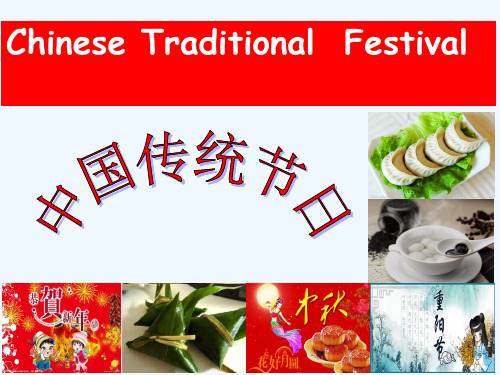
All the family members come back to their home.They stay up for good luck in the Spring Festival Eve.
Mid-Autumn Day(中秋节)
August 15th
moon cakes The traditional food is moon cakes.People have moon cakes and watch the moon on that day.
Qu Yuan threw himself into Mi Lo River.
Hale Waihona Puke The Double Ninth Festival(重阳节)
September 9th
the Old Festival.
Nine represents sun, the brightest thing.September 9th has two nine, so we call it Double Ninth Festival. Nine also means Long in Chinese words, so the Double Ninth Festival is also called the Old Festival.
The Lantern Festival(元宵节)
January 15 rice glue ball. The traditional food is rice glue ball.
Chinese Traditional Festival
The Spring Festival
the most important festival in China.
向外国人介绍中国的传统节日的英语作文
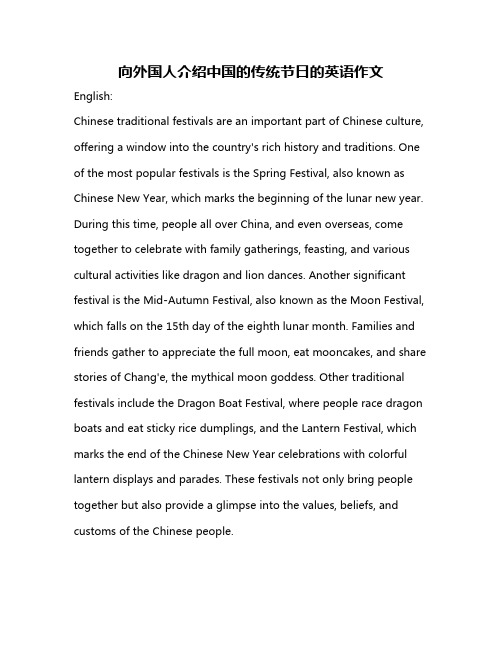
向外国人介绍中国的传统节日的英语作文English:Chinese traditional festivals are an important part of Chinese culture, offering a window into the country's rich history and traditions. One of the most popular festivals is the Spring Festival, also known as Chinese New Year, which marks the beginning of the lunar new year. During this time, people all over China, and even overseas, come together to celebrate with family gatherings, feasting, and various cultural activities like dragon and lion dances. Another significant festival is the Mid-Autumn Festival, also known as the Moon Festival, which falls on the 15th day of the eighth lunar month. Families and friends gather to appreciate the full moon, eat mooncakes, and share stories of Chang'e, the mythical moon goddess. Other traditional festivals include the Dragon Boat Festival, where people race dragon boats and eat sticky rice dumplings, and the Lantern Festival, which marks the end of the Chinese New Year celebrations with colorful lantern displays and parades. These festivals not only bring people together but also provide a glimpse into the values, beliefs, and customs of the Chinese people.中文翻译:中国传统节日是中国文化的重要组成部分,展示了这个国家丰富的历史和传统。
- 1、下载文档前请自行甄别文档内容的完整性,平台不提供额外的编辑、内容补充、找答案等附加服务。
- 2、"仅部分预览"的文档,不可在线预览部分如存在完整性等问题,可反馈申请退款(可完整预览的文档不适用该条件!)。
- 3、如文档侵犯您的权益,请联系客服反馈,我们会尽快为您处理(人工客服工作时间:9:00-18:30)。
Sweeping a tomb
Taqing
Qing Tuan
Duanwu Festival (Dragon Boat Festival)
5TH OF MAY in Lunar Calendar
ZONGZI
DRAGON BOAT
Duanwu Festival (Dragon Boat Festival)
Chinese Traditional Festival
Lunar Calendar
Chinese New Year
Two days before Chinese New Year
Chinese New Year Eve
Chinese New Year
Lantern Festival (Yuanxiao Festival)
She tried to prove woman is also great and not weaker
than man.
www,
As a girl
Follow the man
Hua Mulan
Back home
www,
Tips
Girls are equal with boys and can even do better.
Be courageous to do what you want.
ADD YOUR TITLE
If you love enough and have courage enough,
you can accomplish anything, no matter how ito memorize Chu Yuan
Duanwu Festival (Dragon Boat Festival)
How to make Zongzi?
Chinese Valentine’s Day
7th of July in Lunar Calendar
Niulang & Zhinv
Lantern Festival (Yuanxiao Festival)
How to make Yuanxiao?
Pure Bright Festival (15 days after Chunfen )
Pure Bright Festival
A festival for memorizing our relatives and friends who have gone to another world
Story Outline
Her father is very old, but he was asked to join the army.
Mulan worried about his father’s health, so she made up
and wore man’s clothes to pretend to be a man. Mulan fought for many years. In all that time, no one knew that Mulan was a woman.
Mid autumn Festival
8th of August in Lunar Calendar
Mooncake
Chang E Ascending to the Moon
Mid autumn Festival
Why everything is about moon?
Moon is round on the 15th day of the 8th
www,
Jin guo xu mei
巾帼须眉
woman with a manly spirit
Юлия Тимошенко
www,
Hua mulan( Мулан)
Mulan is a beautiful and only girl in her family.
month. Round shape means family reunion. Fairy Chang E lives on the moon. People pray for luck and happiness.
Mid autumn Festival
How to make mooncake?
15th of Jan in lunar calendar
The end of Chinese New Year
Lantern Festival (Yuanxiao Festival)
Lantern Festival (Yuanxiao Festival)
When and where Lantern Festival comes from?
